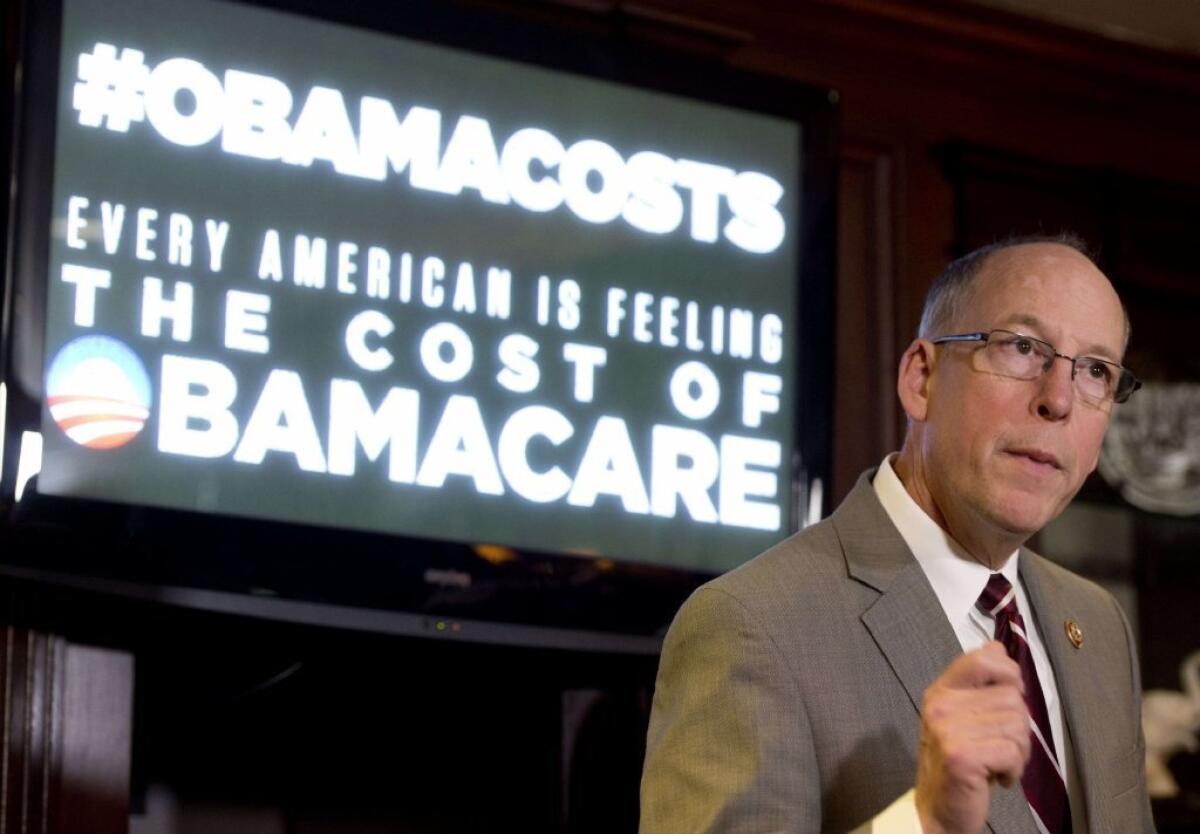Health premiums projected to rise for many small firms under Obamacare

- Share via
A new federal report estimates that 65% of small firms will pay more for employee health insurance as a result of the federal healthcare law while the remaining 35% will see premiums drop.
Those increased healthcare costs will probably be passed on to workers and their families, according to estimates from the Office of the Actuary at the U.S. Centers for Medicare and Medicaid Services.
The report said roughly 11 million of the 17 million people who have health plans through a small employer will see their premiums increase, while 6 million individuals will reap lower premiums. The effect on large employers is “expected to be negligible,” the report said.
FULL COVERAGE: Obamacare rolls out
Federal officials attributed the changes to new “community rating” rules in the Affordable Care Act that prohibit the use of gender, health status and claims history as rating factors and new restrictions on the difference in premiums based on age.
Before the new rules, firms with younger and healthier workers often paid lower premiums and they were more likely to offer coverage.
Many small businesses renewed their existing policies in late 2013. That move enabled them to avoid these new rules and potentially higher premiums for a time until they have to fully comply with the healthcare law.
CMS noted that there was “a rather large degree of uncertainty associated” with these estimates and that a number of other factors will affect benefit decisions among small businesses.
Republican critics of President Obama’s signature law were quick to seize on the latest numbers.
“The Obama administration has finally been forced to disclose what we’ve long feared — the president’s healthcare law means higher premiums for millions of American workers,” House Speaker John A. Boehner (R-Ohio) said in a statement.
The healthcare law offers tax credits to certain small employers to help make coverage more affordable. There are also new government exchanges aimed at giving small firms more purchasing clout and competitive rates.
But enrollment in those small-business exchanges has gotten off to a slow start while more attention and resources go to the marketplaces for individuals.
The Covered California exchange said 571 small firms, representing nearly 5,000 employees and their dependents, have applied for coverage through its marketplace.
The state exchange shut down its online enrollment system for small businesses this month due to technical problems.
The prospect of higher premiums is nothing new for many businesses. In California, employer premiums for family coverage grew nearly 6% last year.
Since 2002, premiums for employer health insurance in the state have jumped 185%, more than five times the 33% increase in the state’s inflation rate over that period, according to the California HealthCare Foundation.
One option for small firms is to stop offering health insurance and encourage their employees to buy coverage themselves in government exchanges. Some of their workers could be better off going that route if they qualify for federal premium subsidies based on their income.
The actuarial report said “there is considerable uncertainty as to whether small employers will decide to terminate their existing offer of health insurance coverage and send their employees to individual market exchanges.”
This month the Obama administration again delayed a requirement that large employers provide their workers with health benefits.
Under the healthcare law, employers with more than 50 full-time employees must offer affordable health benefits or pay fines. That employer mandate will now be phased in and won’t fully take effect until 2016.
Small businesses with fewer than 50 full-time workers continue to be exempt from any requirement to provide health benefits.
ALSO:
Covered California hiring more workers to fix service woes
Affordable Care Act will prompt some to work less, report says
California exchange pulls error-ridden physician directory -- again
More to Read
Inside the business of entertainment
The Wide Shot brings you news, analysis and insights on everything from streaming wars to production — and what it all means for the future.
You may occasionally receive promotional content from the Los Angeles Times.











